How Climate Disruption May Undermine Climate Policy
The long-term harms from climate change over the next decades may undermine support for efforts to reduce emissions
Almost two straight months of wildfires and smoke in California are a tangible sign of the impacts of climate change on our lives and our world. This article from the New York Times a couple of weeks ago does a good job of laying out why the wildfires in California are only one example of the impacts we will all face from climate change over the coming decades – and how those impacts will only increase. The article also does a good job of noting how even aggressive action on reducing greenhouse gas emissions will not stop increasing impacts from climate change – many of those impacts are already “baked in” to the global systems that we depend on. For instance, at a most basic level, it takes a long time for water to heat up (think about how long it takes to boil a pot of water, especially when you watch it!). The thermal inertia in our oceans has meant that the impacts of warming the global atmosphere from greenhouse gases has been moderated to some extent by cooler oceans. But the flip side is that even if we manage to keep the atmosphere from getting warmer than it already is (by drastically cutting greenhouse gas emissions), the oceans will continue to warm over time, as they “catch up” to the atmosphere. Which will mean the world will continue to warm, with ongoing impacts globally. The Times article also does a good job of making clear that despite all of this, it is still incredibly urgent and necessary to reduce emissions, because things could still get worse (far worse!) if we don’t take action.
But there is one aspect that that the Times article missed that I think is particularly important. What will be the political impact if we, as a society, do take drastic action to reduce emissions, and yet climate impacts continue to get worse (as they will, because of the above dynamic)? I wrote about this over a decade ago, and pointed out that there is a real risk that people, seeing the deterioration in the global climate despite their best efforts to reduce emissions, may give up and become demoralized. I pointed to examples where those kind of dynamics have played out in other environmental contexts. And that worries me even more now, as the real negative impacts of climate change begin to be felt. They can motivate people to act now, but will people continue to be motivated, and to maintain action over time, as fires burn, droughts get worse, oceans rise, despite draconian cuts in emissions? Why make sacrifices, people may think, if things are continuing to get worse?
In that article, I laid out a number of ways to address this risk of backsliding and backlash against climate policy in the wake of ongoing climate harms. Here I want to focus on two. One is to take affirmative steps to undo those harms, so that people can see genuine and immediate progress in their lives. These kinds of restoration efforts can be at the local or regional scale – efforts like restoring forests or wetlands to make them more climate resilient, or to manage water better and more effectively so that we continue to have what we need and enjoy, even during droughts. These kinds of efforts generally fall within the scope of what is called adaptation. Ironically, for many years adaptation efforts were downplayed in the climate policy community for fear they would undermine efforts to reduce greenhouse gas emissions – but today I think they will be essential to maintain support for climate policy in the face of a changing world. But restoration can also occur at a global level – whether it is trying to undo the acidification of oceans from climate change through massive introductions of alkaline rocks into the oceans, or affirmative removal of greenhouse gases from the atmosphere. These are generally characterized as a version of geoengineering, and they have been extremely controversial for a range of very good reasons — concerns about whether they would be effective or have dire negative unintended consequences, and whether they might again undermine efforts to reduce emissions. The first set of concerns are serious ones and are extremely important to address. But I think, as with adaptation, the latter set of concerns may in fact be 180 degrees wrong. Rather than undermining our efforts to reduce emissions, efforts to reduce the global harms from climate change may be essential to maintaining political support to act on emissions.
There’s another approach to addressing this risk around the ongoing impacts of climate change causing a backlash to climate policies. If climate policies are not seen as net negatives – whether economically or socially or politically – to key political and economic actors, then there is a much lower risk we will see substantial backlash against those policies. Why push back on something that is now a good thing for you? Indeed, we might even lock in aggressive climate policies (and create support for further aggressive policies) if those climate policies create their own political and economic support by building up supportive interest groups. I, along with a range of other scholars, have been exploring what we call the political economy of decarbonization in general – but I think it has real importance in addressing the risk of backlash from ongoing climate impacts.







Reader Comments